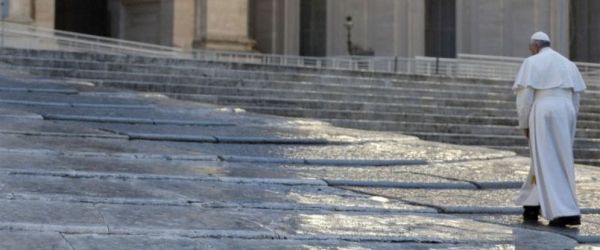Today’s Gospel […] invites us to contemplate the Transfiguration of Jesus (cf. Mk 9:2-10). This episode is related to what had happened six days earlier, when Jesus had revealed to his disciples that in Jerusalem he would “suffer many things, and be rejected by the elders and the chief priests and the scribes, and be killed, and after three days rise again” (Mk 8:31). This message led to crisis for Peter and the entire group of disciples, who rejected the idea that Jesus would be scorned by the leaders of the people and then put to death. Indeed they were waiting for a powerful, strong, dominating Messiah, whereas Jesus presented himself as a humble and gentle servant of God, and servant of mankind, who would offer his life in sacrifice, passing by way of persecution, suffering and death. But how could one follow a Master and Messiah whose earthly existence was to end in that way? That is what they were thinking. And the answer came precisely from the Transfiguration. What is the Transfiguration of Jesus? It is a preliminary Paschal apparition.
Jesus took with him the three disciples Peter, James and John, “and led them up a high mountain” (9:2); and there, for a moment, he showed them his glory, the glory of the Son of God. This event of the Transfiguration thus allowed the disciples to confront Jesus’ Passion in a positive way, without being overwhelmed. They saw him as he would be after the Passion: glorious. And in this way Jesus prepared them for the trial. The Transfiguration helps the disciples, and us too, to understand that the Passion of Christ is a mystery of suffering, but it is above all a gift of love, of infinite love on Jesus’ part. The event of Jesus transfiguring himself on the mountain enables us to better understand his Resurrection. In order to understand the Mystery of the Cross, it is necessary to know ahead of time that the One who suffers and who is glorified is not only a man, but is the Son of God who, with his love faithful to the end, saved us. In this way the Father renews his messianic declaration about the Son, which he had made previously on the bank of the River Jordan after his Baptism, exhorting: “listen to him” (v. 7). The disciples are called to follow the Master with trust, with hope, notwithstanding his death; the divinity of Jesus must be made manifest precisely on the Cross, precisely in his dying “in that way”, so that here Mark the Evangelist places in the mouth of the centurion the profession of faith: “Truly this man was the Son of God!” (15:39).
[Pope Francis, Angelus 25 February 2018]












